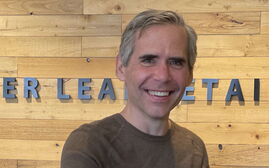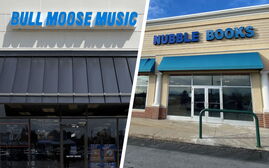Processing Your Payment
Please do not leave this page until complete. This can take a few moments.
- News
-
Editions
-
- Lists
-
Viewpoints
-
Our Events
-
Event Info
- Women's Leadership Forum 2025
- On the Road with Mainebiz in Bethel
- Health Care Forum 2025
- On The Road with Mainebiz in Greenville
- On The Road with Mainebiz in Waterville
- Small Business Forum 2025
- Outstanding Women in Business Reception 2025
- On The Road with Mainebiz in Bath
- 60 Ideas in 60 Minutes Portland 2025
- 40 Under 40 Awards Reception 2025
- On The Road with Mainebiz in Lewiston / Auburn
- 60 Ideas in 60 Minutes Bangor 2025
Award Honorees
- 2025 Business Leaders of the Year
- 2024 Women to Watch Honorees
- 2024 Business Leaders of the Year
- 2023 NextUp: 40 Under 40 Honorees
- 2023 Women to Watch Honorees
- 2023 Business Leaders of the Year
- 2022 NextUp: 40 Under 40 Honorees
- 2022 Women to Watch Honorees
- 2022 Business Leaders of the Year
-
-
Calendar
-
Biz Marketplace
- News
- Editions
- Lists
- Viewpoints
-
Our Events
Event Info
- View all Events
- Women's Leadership Forum 2025
- On the Road with Mainebiz in Bethel
- Health Care Forum 2025
- On The Road with Mainebiz in Greenville
- On The Road with Mainebiz in Waterville
- + More
Award Honorees
- 2025 Business Leaders of the Year
- 2024 Women to Watch Honorees
- 2024 Business Leaders of the Year
- 2023 NextUp: 40 Under 40 Honorees
- 2023 Women to Watch Honorees
- 2023 Business Leaders of the Year
- + More
- 2022 NextUp: 40 Under 40 Honorees
- 2022 Women to Watch Honorees
- 2022 Business Leaders of the Year
- Nomination Forms
- Calendar
- Biz Marketplace
Born of retail: A software company that ‘eats, sleeps and breathes retail’
 Photo / Tim Greenway
Brett Wickard founded FieldStack to deliver cloud-based retail support software that was based on insights he gained as the founder and long-time owner of entertainment retail chain Bull Moose.
Photo / Tim Greenway
Brett Wickard founded FieldStack to deliver cloud-based retail support software that was based on insights he gained as the founder and long-time owner of entertainment retail chain Bull Moose.
Brett Wickard recalls a light-bulb moment that changed his trajectory from being the owner of an entertainment retail chain to the developer of a cloud-based retail support software.
Wickard, a Bowdoin College alumnus, founded Bull Moose, a Portland-based music and entertainment retailer that opened in 1989. (In 2022, he sold the company to employees and stepped down as president and CEO, but still serves as chair.)
Along the way, he was contacted by Universal Music, a large music distributor and source of Bull Moose products. Universal had been analyzing their customer data and found that Bull Moose’s inventory coverage was much stronger and returns were far lower than other retailers. “They said, ‘Whatever your secret is, could you sell it to the rest of our customers?’” Wickard says. “And we did have a secret. It was having our operations talk to each other in real time.”
But innovative ideas don’t exist sui generis. That light-bulb moment was grounded in previous insights that had unfolded through the Bull Moose experience. The idea for integrated retail operations came through something simple — getting to know the customers.
“We were having the conversations: ‘Why do people choose to come in? Why does somebody buy something?’” says Wickard. “If we could find a way to capture that information, we could get ahead of other retailers.”
They said, ‘Whatever your secret is, could you sell it to the rest of our customers?’
— Brett Wickard, FieldStack
Predictive data
Early on, Wickard and his team realized there were certain people who, when they bought something, everyone else was buying it a few days later.
He noticed one customer in particular.
“Jack would buy something and then everyone would buy it. So we started thinking about how we could use that information to be more predictive.”
To get that predictive data, they started a frequent buyer program and measured what people were buying.
“The secret was that we were also getting products sold back to us for resale,” he says. “That mattered, too, because it helped us predict what people wanted and didn’t want.”
Wickard developed a software platform that could integrate retail applications and leverage real-time data, advanced analytics and automation. In 2013, he founded a sister company, FieldStack, and continued software development by using Bull Moose as an incubator.
The platform integrates operations that occur in today’s complex retail environment — ecommerce, stores, warehouses, special orders, point-of-sale devices, curbside pick-up, self-check-out units and more. Operating in real time, the software allows the operations to “talk” with one another across the organization, which means that a retailer can react quickly — says, by ordering something that’s out of stock.
“Say a client is selling out a product in one of their stores,” says Wickard. “That’s communicated immediately up their supply chain to their warehouse, which places orders with their vendors to prepare for future demand.”
Born of retail
The company unfolded with hires in software development, sales and other positions.
“And because we’re born of retail — and almost everyone here has worked in retail or we make everyone go out and work in retail — clients know that we’re a software company that eats, sleeps and breathes retail,” he says. “That makes a difference.”
FieldStack’s innovative strategies include sending new hires to work in retail.
“We’ll have mathematicians and top-tier developers and we tell them to work in a retail store,” Wickard says. “Using FieldStack in the wild, you get an experience you wouldn’t have unless you’ve been faced with a line of customers, wrapping up orders for them.
He continues, “We love having folks experience that, because it changes how we write our software. We write with the clerks in mind; the clerks are the ones under the most pressure. Our strategy is to make it so clerks can just start using our software and not feel they have a giant learning curve.”
Self-financed, FieldStack today serves mid-sized and large omni-channel retailers, ranging in size from a handful of stores in a single city to national chains with over a hundred stores and growing. With thousands of FieldStack installs in place, revenue growth has been over 40% year-over-year. The great thing about the cloud, says Wickard, is that the company can take on every retail sale around the world without having to own infrastructure.
Installation of the software can either be done online or with FieldStack-installed devices such as cash drawers, credit card readers and customer displays, all connected to each other and to the corporate network. Since devices can get beat up, they can easily be replaced.
“Today’s retailers are increasingly looking for innovative cloud-based solutions, and as importantly, full-service partners who can help them realize the many benefits of technology while allowing them to focus on serving their customers,” says Wickard.
The significance of the name FieldStack?
“I’m a math nerd, and stacks and fields are computer science and math terms,” says Wickard. “But we like that it also connects to Maine — a stack of wood in a field gives you a sense of security in the winter.”
FieldStack
www.fieldstack.com / South Portland
Founded: 2013
Founder and CEO: Brett Wickard
What it does: Develops cloud-based suite of lean retail applications
Workforce: 35
Funding: Self-financed













0 Comments